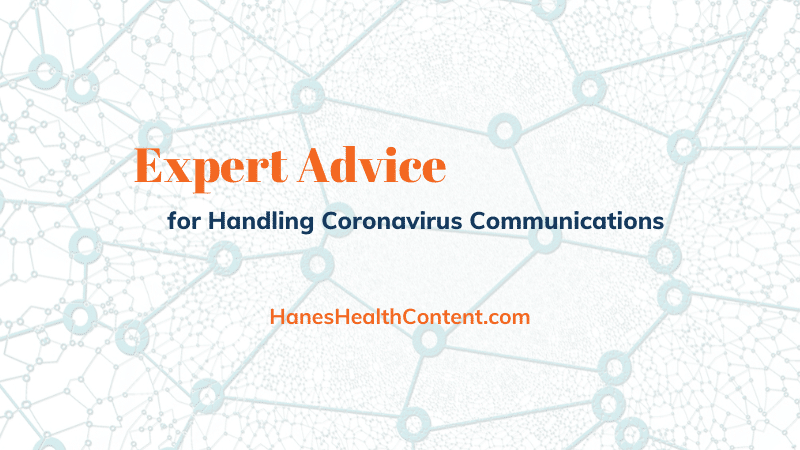The survival of your healthcare-related business tomorrow may depend upon the decisions you make today.
If you fail to adequately address the concerns of your patients, clients and their family members about how your organization is approaching the novel coronavirus pandemic, then you may lose their business forever.
On the other hand, if you immediately implement an effective communications campaign, your business can continue to thrive during and after this horrible event we’re all living through.
I’ve written this brief article to help all kinds of healthcare-related businesses navigate these difficult public relations waters. In particular, I’m speaking to:
- Hospitals
- Long-term care facilities
- Home health providers
- Senior care providers
But the tips I’m about to share could equally benefit:
- Personal care providers, such as aestheticians and hairdressers
- Health service businesses, including fitness centers
As an RN with a background in PR and marketing, I understand some basic principles about how to speak to the public about difficult topics like COVID-19. Here’s my expert advice on how to handle the situation.
1. Lead with Empathy, not Expertise
Under normal circumstances, it’s perfectly fine to position yourself as the top expert in your field. But these aren’t normal circumstances. Don’t make your main message to clients, patients and their family members: “You don’t have to worry about anything. We’re experts!”
Instead, lead with empathy in your communications. To do this, acknowledge the feelings your audience may be experiencing right now. People might feel frightened, confused, anxious and frustrated during this time. In your communications, start by acknowledging this. Empathy builds trust and fosters goodwill.
2. Position Yourself as a Partner
People’s emotions during the coronavirus outbreak will be driven in part by practical problems they’re unable to solve on their own. For example, the adult children of an elderly parent living 1,000 miles away may worry for their mom because they can’t hop on a plane to be with her. Create a list of the top practical issues your target audience might be facing, and then address how you can partner with them to solve these problems.
Using the example above, you might offer to provide phone reports from the parent’s in-home caregiver after each visit. This keeps the adult child in the loop and alleviates the frustration of not being able to be there in person.
3. Maintain Ongoing Communications
Don’t issue one press release that touts the disinfection measures you’re taking to reduce the spread of coronavirus inside your facility and leave it at that. Instead, quickly develop an ongoing communications campaign to provide frequent updates that address your audience’s key questions, feelings and problems. Investing in a consistent communications program right now can boost your organization’s reputation as a leader that puts clients first.
Speaking of investing, you should also try to see the coronavirus pandemic as an opportunity for your business, not just a threat. I want to echo the opinion Geoffrey James expressed in his excellent Inc.com piece, “How to Succeed During the Coronavirus Outbreak: When Everyone Goes Left, You Should Go Right,” namely that businesses should expand instead of contract right now, even as the economic effects of the COVID-19 pandemic continue to ripple. One important place to invest is in your communication efforts, because they provide a direct pipeline for reaching your current and prospective clients with reassuring, empathetic messaging that fosters trust to retain existing business while also welcoming the clients fleeing the competitors that botched their outreach efforts.
During this turbulent period, you may feel you don’t have the time (let alone the expertise) to think about your marketing and communications efforts. That’s understandable. You probably have many other major logistical decisions to make.
But you shouldn’t ignore your communications during this crisis. You can seek the help of experts to help you develop the messaging that can get your healthcare-related business through this crisis and see it thrive on the other side.
And don’t wait to act. The best content strategists and writers already are being inundated with requests – and they only have so much bandwidth available.
Eventually this crisis will pass. I wish everyone the very best – professionally and personally – as they navigate this difficult time.
This article originally appeared on LinkedIn – where you can follow me.

